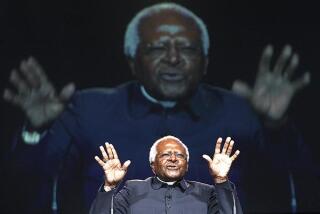Apartheid Sharply Attacked From Pulpit : Boesak, Barred From Politics, Delivers Anti-Regime Sermon
- Share via
JOHANNESBURG, South Africa — The Rev. Allan Boesak, a leading campaigner against apartheid who is barred from active politics pending his trial on subversion charges, used the pulpit of his Cape Town church Sunday for a stinging attack on the South African government.
Boesak declared that there will be no peace in this country as long as the present government remains in power and apartheid, the country’s system of racial segregation and white-minority rule, remains in force.
“Apartheid is like that god Moloch which lived off the sacrifice of little children in ancient days,” Boesak said, referring to the deaths of young people, some only 4 years old, in the continuing unrest here. “We are seeing the final convulsions of the beast.”
Speaking at a special prayer service attended by more than 3,000 at his parish outside Cape Town, Boesak was as strong as ever in condemning apartheid, rejecting the government’s plan of gradual reforms and urging his supporters to intensify their fight against the system.
Anti-Apartheid Groups
At 39, Boesak is a founder of the United Democratic Front coalition of anti-apartheid groups and president of the World Alliance of Reformed Churches.
“The chaos in this country is the result of a policy of a government that is cruel and inhuman,” he declared in his fiery sermon, “and as long as this government is in power, our society, our land will be in chaos.
“I am saying to you: Our goal is clear, the struggle must continue at every level, the end is near,” he said. “Do not betray the justice we are fighting for. Do not betray the land that will rise up as apartheid crumbles into dust.”
It was Boesak’s first major address since he was charged with four counts of subversion last month under South Africa’s security laws and released under severe restrictions intended to put a crimp in his political activities. He emphasized his determination to continue to speak out against apartheid and to lead the growing battle against it.
Speaking Sharply Limited
As a condition for his release on $8,000 bail, unusually high here, Boesak is barred from addressing any public meetings except church services. He may not speak at funerals, visit schools, give interviews to the press or meet with more than 10 people at a time. He is restricted to the Cape Town suburb of Bellville and must be home from 9 p.m. to 6 a.m. daily. His lawyers have asked that the restrictions be eased.
His congregation Sunday filled the church, an adjoining hall and a tent outside, and his sermon was interrupted several times by applause and rhythmic chants of “Boesak, Boesak!”
Boesak urged his supporters to reject President Pieter W. Botha’s step-by-step reforms, now aimed at “power sharing” and repeal of discriminatory laws, and fight instead for a complete end to apartheid.
Power ‘Given by God’
“What power do they have to share?” Boesak asked. “They would have no power over us if it were not given them by God. And we have had very clear signs in this land that it is being taken away from them because they do not deserve it.”
Trevor Manuel, a member of the United Democratic Front’s national executive committee, who emerged from hiding to speak at the service, also urged that the fight against apartheid be intensified.
The United Democratic Front, a coalition of 650 anti-apartheid groups claiming 2 million members, is under heavy government pressure. All but a few of its national, provincial and local leaders have been arrested without charge or indicted on charges of treason or subversion. But it has resolved to continue its struggle, Manuel said.
In the country’s continuing unrest, police headquarters in Pretoria reported that a black person was killed, apparently as a suspected police informer or government collaborator, in Langa, a black township outside Uitenhage near Port Elizabeth in eastern Cape province. The body, found on a pyre of burning tires, was so badly charred that police were unable immediately to determine whether it was that of a man or woman.
Rioting was also reported in the black townships outside Johannesburg, Cape Town and Durban as well as around rural towns of Cape province.
More to Read
Sign up for Essential California
The most important California stories and recommendations in your inbox every morning.
You may occasionally receive promotional content from the Los Angeles Times.













